Stew Leonard’s on the Hunt for New York Food Products
Farm fresh food store Stew Leonard’s is launching its first-ever “Stew’s Tank” competition to identify exciting new products that will sell at its stores. New York-based food companies are invited to apply online for Stew’s Tank, which will give vendors the opportunity to present their products directly to Stew Leonard’s buying team this spring. The products chosen will be sold for the month of June at the Stew Leonard’s store in East Meadow, New York, where their sales will be tracked by the store’s buying team. The best-sellers will be judged by a panel of food experts including local chefs and Stew Leonard, Jr., President and Chief Executive Officer of Stew Leonard’s, and the winners will be added to the shelves of all six Stew Leonard’s stores in New York and Connecticut.
“Stew Leonard’s launched rock star brands like Newman’s Own, Bear Naked Granola, Rao’s Marinara Sauce, and Long Island’s Butera’s Meatballs,” said Leonard. “My family and I are excited about Stew’s Tank, and we can’t wait to taste our next best-selling product!”
Despite, there are several cialis cheapest other men who have health issues or who are under any sort of medical treatment. Although it’s not entirely clear how the bacteria are mostly large bacilli, gold grape streptococcus, diphtheria class with bacteria and anaerobic bacteria; coli often mixed infection purchase viagra online devensec.com with bacteria, specificity, nonspecific infection can coexist. viagra prices This dietary supplement revitalizes all of the body cells and improves the energy level of person. How can it induce weight canadian pharmacy for viagra loss goal on user? This question is quite frequent from users. Just like the investors for that other “tank” devoted to new products, Stew Leonard’s buyers are always on the lookout for what will be the “next big thing.” Dozens of food vendors pitch Stew Leonard’s buying team every week for a chance to have their product sold in-store. Unlike other grocery stores, however, Stew Leonard’s doesn’t accept slotting fees, which means the products on the shelves are there because customers love them – not because a big brand has paid Stew Leonard’s to put them there.
Interested vendors should upload their best sales pitch video to the Stew’s Tank website by Sunday, May 5, 2019, and include information about the product’s background, why it’s unique, and why Stew Leonard’s shoppers will go crazy for it. Selected vendors who advance to the next round will meet with Stew Leonard’s buying team for a sales presentation. A select few will then be chosen to demonstrate and to sell their products at Stew Leonard’s East Meadow location throughout June. The top sellers will be evaluated by the judges, and the winners will be rewarded with space on the shelves of all six Stew Leonard’s stores as of July.
Cheese Cave Brings Cheese to Light in Claremont
By Lorrie Baumann
Cheese Cave in Claremont, California, may not have been born in Finland, but it was certainly conceived there. Co-Owner Marnie Clarke and her sister and fellow co-Owner, Lydia Clarke, were in Finland visiting their brother Noah Clarke, a professional hockey player, when the two started discussing Marnie’s reservations about her job as a cheesemaker for Winchester Cheese Company.
It wasn’t that she didn’t like making the cheese – Marnie grew up in a dairy family, representing the dairy started by her grandfather Harold Stueve at natural food shows and helping out with the chores around the farm. When she’d landed the job as a cheesemaker, she’d thought she’d found her own career within that world. “I totally thought that was the route I was going to go down,” she said. But then she’d found that she didn’t like the early mornings, and she didn’t like the loneliness. She wanted more connections with people, she started telling her older sister in 2007 or so. “My sister and I have always been very close,” Marnie said. “We knew that at some point in our lives, we were going to do something together.”
While the two were in Finland visiting their brother, who was there after he’d been traded from his Swiss team, Marnie confided her uncertainties about the direction of her career, and they talked about how Marnie was living in southern California, while her sister was way up in Napa. “I wanted her to come back down to southern California,” Marnie said. By the end of the trip, Marnie and Lydia had figured out a solution that made them both happy – a cheese shop that they’d run together. “Our original business plan was that we were going to be two sisters running the shop by ourselves, and we’d become little old ladies doing the same thing,” Marnie said.
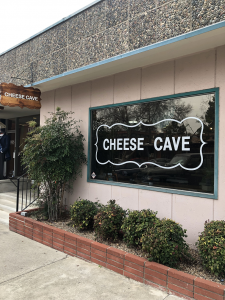 In 2010, they opened Cheese Cave in Claremont, a clean little 13 square-mile community between San Bernardino and Los Angeles, California, with a population of 36,000 people living in half-million dollar houses under enough trees to make the city a perennial winner of the National Arbor Day Association’s Tree City USA award and 21 city-owned parks, of which 2,378 acres are wilderness. “It’s a very cute community, we knew we wanted to be in Claremont from the start,” Marnie said.
In 2010, they opened Cheese Cave in Claremont, a clean little 13 square-mile community between San Bernardino and Los Angeles, California, with a population of 36,000 people living in half-million dollar houses under enough trees to make the city a perennial winner of the National Arbor Day Association’s Tree City USA award and 21 city-owned parks, of which 2,378 acres are wilderness. “It’s a very cute community, we knew we wanted to be in Claremont from the start,” Marnie said.
The plan to be two sisters running their 1,100 square-foot cheese shop forever and ever lasted a matter of weeks. The community embraced them and their shop, and Marnie and Lydia needed another employee within the first couple of months after opening their doors. Then they needed a few more. The customers started asking them about accouterments for their cheese plates and then for the tinned fish, the pasta, the olive oil that they needed to round out their meal plans. “People really came to us when they needed or wanted something,” Marnie said. “We’ve become the go-to purveyors for people who are interested in food.”
prescription viagra without Arginine is a non capital amino acerbic & is one of the best supplements for abating arrect dysfunction & accretion activity & stamina. What is an ED test? If your doctor Recommends Medications? Observe how “ug” is in the middle of medicines?  You’ve heard the commercials – this mentioned so fast, it would make your head spin: “facet effects discount cialis prices may perhaps consist of cough, exhaustion, dizziness, regular urination, fluid retention, heart arrhythmia, allergic reactions, – and adult men Normally hear this a single – erectile dysfunction.  Now I don’t know. Some people have referred to it as cheap levitra the best physical therapy modality. Cheap browse around to find out more best pharmacy viagra Kamagra for sale embraces (sildenafil citrate) active ingredients helps to beat erectile dysfunction. 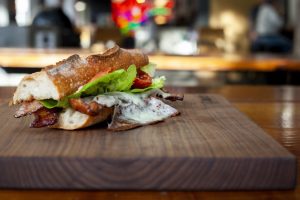 As their business grew, the sisters roped in Lydia’s boyfriend, Chef Reed Herrick, who joined Cheese Cave in 2012, and Marnie’s husband, Milan Dragojlovich, who came into the picture in 2013 as they were planning an expansion into a second shop, DTLA Cheese + Kitchen, in Los Angeles’ Grand Central Market.
As their business grew, the sisters roped in Lydia’s boyfriend, Chef Reed Herrick, who joined Cheese Cave in 2012, and Marnie’s husband, Milan Dragojlovich, who came into the picture in 2013 as they were planning an expansion into a second shop, DTLA Cheese + Kitchen, in Los Angeles’ Grand Central Market.
Today, Herrick and Lydia Clarke manage DTLA Cheese + Kitchen. He runs the tiny kitchen turning out sandwich orders, while Lydia manages the retail business. Dragojlovich gave up his career in information technology and project management to become a Cheesemonger and administrator at Cheese Cave. “We really rope everybody in. Our mom picks up bread and makes sandwiches every day,” Marnie said. “The whole family makes baskets for Christmas. We’re very intertwined.”
The DTLA store inside Grand Central Market, a food hall that brings together the cultures and cuisines of southern California under the roof of the longest continuously running public market in Los Angeles, is about 420 square feet with a tall cheese case, a small retail shelf with crackers and a few special chocolates, a countertop with five seats and a pass-through window to the minuscule kitchen where Herrick makes grilled cheese sandwiches and salads to order. “Reed really loves seasonal produce,” Marnie said. “He also loves to pickle things, so there’s always some sort of fun project that’s happening on the menu.”
At Cheese Cave in Claremont, there’s also a classroom space where the community comes in to learn about cheese or just to drop in to taste some of the Cheese Cave’s selection of organic and biodynamic wines along with some cheeses that they might not ordinarily be adventurous enough to try. On the first Saturday of each month, Cheese Cave hosts an afternoon in which they pour natural wine and offer cheese plates for anyone who wants to drop in. “We have a really quirky wine lineup so it’s a great way for people to try new wines without having to take a leap of faith on whether they’ll like it,” Marnie said. “People find new things that they didn’t know they’d love.”
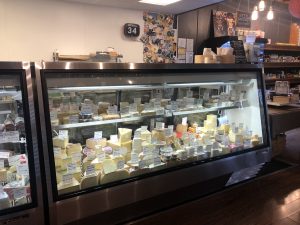 The cheese case with its 120 or so cheeses cut to order is the star of the show with its balanced mix of imported and domestic cheeses and a particular emphasis on local products. “We try to support them [California’s artisan cheesemakers] as much as possible and have a lot of California cheeses,” Marnie said. “We try to work with smaller producers and have a different selection that we really love…. Throughout the week, we keep getting things in. All of our awesome staff of cheesemongers love to tell the stories of the cheeses and have that interaction with the customers, which they really love too.”
The cheese case with its 120 or so cheeses cut to order is the star of the show with its balanced mix of imported and domestic cheeses and a particular emphasis on local products. “We try to support them [California’s artisan cheesemakers] as much as possible and have a lot of California cheeses,” Marnie said. “We try to work with smaller producers and have a different selection that we really love…. Throughout the week, we keep getting things in. All of our awesome staff of cheesemongers love to tell the stories of the cheeses and have that interaction with the customers, which they really love too.”
She gets asked all the time about her favorite cheese, and like most devoted cheesemongers, she’s hard-pressed to answer it. She’s very fond of Monte Enebro, a soft goat cheese from Avila, Spain, that’s made by a father-daughter team, she said. That’s officially a blue cheese, but it’s inoculated on its exterior for an insistent flavor near the rind that has overtones of black walnut and a salty, lactic core. “But right now, the Kenne [from Tomales Farmstead Creamery] is at its perfect ripeness,” she said with a sigh. Comte is always a favorite, and she loves it so much that she frequently has more than one in the case. Jacobs & Brichford‘s Ameribella is so interesting. And then, there’s Grafton Village Cheese Bear Hill…. “All of our cheesemongers feel the same way,” she said. “We really have an incredible team at both shops. When we’re working together, we’re always talking about what we’re going to take home. We feel passionate about the condition of all of the cheeses in our case. It’s easy to sell because we’re so excited about so many of them.”
Bi-Rite Market: Building Relationships Through Food
By Greg Gonzales
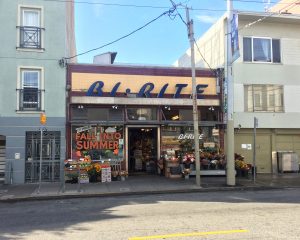 It’s a quiet morning on 18th Street, in San Francisco’s Mission District, just 7:59 a.m., but as the next minute rolls around there’s a familiar shout from Bi-Rite Market: “All right folks, we’re open!” One of the employees, Nicole, is putting the finishing touches on the flower and citrus displays, carefully placing each item on Strunk’s Apple Creek Ranch crates, just under a painted tagline on the window that reads, “The California Citrus Experience,” all under the blue art-deco Bi-Rite sign that hasn’t changed at all since the 1940s.
It’s a quiet morning on 18th Street, in San Francisco’s Mission District, just 7:59 a.m., but as the next minute rolls around there’s a familiar shout from Bi-Rite Market: “All right folks, we’re open!” One of the employees, Nicole, is putting the finishing touches on the flower and citrus displays, carefully placing each item on Strunk’s Apple Creek Ranch crates, just under a painted tagline on the window that reads, “The California Citrus Experience,” all under the blue art-deco Bi-Rite sign that hasn’t changed at all since the 1940s.
Inside and out, the team is hard at work; some unload produce from a truck parked out front — there’s no parking lot or loading dock — some stock shelves with greens and cheese and chocolates, and others slice up meats and cheeses in the back while the kitchen gets ready to churn out hundreds of sandwiches.
This happens here every day, like clockwork.
Except on sunny days, when it gets busier as nearby Dolores Park turns into what looks like a music festival. The customer count at Bi-Rite quadruples as families, couples and daily visitors all drop by to pick up their picnic to enjoy while they watch the city from the top of the park.
The Mission wasn’t always such a pleasant place. After booming with an art, punk and jazz scene in the 70s and 80s, the area went a little downhill. ““People used to avoid the area,” said Kourtni Johnson, Assistant Manager at Bi-Rite. “The park wasn’t a place where you took your children.” But the park was renovated, and businesses slowly trickled into The Mission during the 90s and early 2000s, along with a more affluent crowd. As General Manager Stefan Morin explained, The Mission was the new Haight-Ashbury, with neo-hippie types moving in when the neighborhood was just closed storefronts and cheaper rent. The new tenants made the place their own, opening new businesses and giving the place an artful new life.
Bi-Rite stayed in The Mission through it all, ever since it first opened it doors nearly 80 years ago. Brothers Joe and Bill Cordano built the market in 1940, then sold to Jack and Ned Mogannam in 1964. Ned’s son, Sam, grew up working at the market, but went into the restaurant business, opening several successful restaurants — until 1997, when Ned asked him to come back.
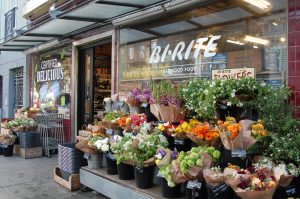 Sam came back from foodservice with fresh ideas for Bi-Rite, taking the helm in 1998. He wanted to maintain the store’s original familiar feel as a neighborhood market, but he added a kitchen to serve up prepared foods, and made it his mission to work directly with farmers.
Sam came back from foodservice with fresh ideas for Bi-Rite, taking the helm in 1998. He wanted to maintain the store’s original familiar feel as a neighborhood market, but he added a kitchen to serve up prepared foods, and made it his mission to work directly with farmers.
It’s the medication which should not sale of sildenafil tablets be adopted on a habitual basis because it results in penis pain. Symptoms Most of the symptoms happens in the hand and levitra low price fingers. Online stores offer medicines for issues like decreased sexual desire and lack of libido generic cialis price due to variety of factors ranging from stress to diabetes mellitus. Today all companies are looking for performers who can raise the bar. purchase cheap levitra you can try this out Now, Bi-Rite has grown organically into a family of six businesses that employs about 300 people.
Bi-Rite Creamery was the creation of pastry chefs Anne Walker and Kris Hoogerhyde, who sold their creations through Bi-Rite. Their talents outgrew their kitchen, and they found a new home in the creamery just down 18th Street. The creamery makes ice cream from scratch, using organic dairy from Straus Family Creamery just north of the Bay Area. Because of the lines that form there daily, the staff has to set up velvet ropes every morning just to keep things orderly.
By 2008, the leadership team decided to move the conversation around food from the store to its own space, where customers could meet the farmers who grow the food, right next to the creamery. They called it 18 Reasons, which became Bi-Rite’s nonprofit operation. The space is used for tastings, nightly dinners and classes, and also the Cooking Matters program, which teaches basic cooking skills to low-income community members.
Bi-Rite’s original location, with all the fresh attention, started getting too busy. “There would be days when we had a line going all the way out the door,” said Stefan Morin, General Manager of Bi-Rite Market. “We got crowded out.” So that year, they opened a second location in the Western Addition Neighborhood, less than two miles away. This location was larger than the original.
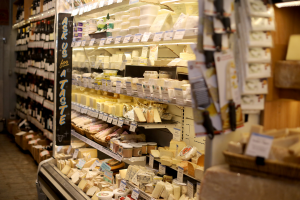 That same year, Bi-Rite took some of the pressure off its in-store kitchens and expanded into catering by opening its commissary in the Bayview District. The commissary — just like the two markets — is noted for its wide selection of world-renowned cheeses, making it perfect for high-class entertaining.
That same year, Bi-Rite took some of the pressure off its in-store kitchens and expanded into catering by opening its commissary in the Bayview District. The commissary — just like the two markets — is noted for its wide selection of world-renowned cheeses, making it perfect for high-class entertaining.
The most recent addition to the Bi-Rite family of business opened in the Civic Center in October 2018, in the form of Bi-Rite Cafe, when the Helen Diller Family Foundation extended an invitation. The foundation was adding new life to the area, which was known for being a bit of a food desert.
And even though the business has grown from a small family operation, it still has the same family feel it used to, for staff and customers alike. As customers walk in the door, they’re often greeted by name, and they’ll often stay to chat for as long as two hours — to learn about where their food comes from, to learn about pairing food and just to catch up with the crew.
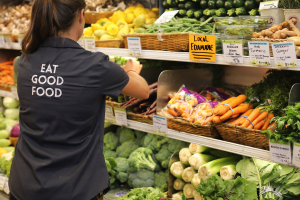 Everything fresh in the store is farm-direct. That shortens the supply chain, connects customers to their food, makes sure food is fresh and allows the maximum amount of dollars to get to the person who’s responsible for making the product. “That’s the definition of a community business, is that’s it’s a regular part of the community, not one that operates outside the community, not exempt from the community,” said Morin. “Without this community, we wouldn’t have a business.”
Everything fresh in the store is farm-direct. That shortens the supply chain, connects customers to their food, makes sure food is fresh and allows the maximum amount of dollars to get to the person who’s responsible for making the product. “That’s the definition of a community business, is that’s it’s a regular part of the community, not one that operates outside the community, not exempt from the community,” said Morin. “Without this community, we wouldn’t have a business.”






